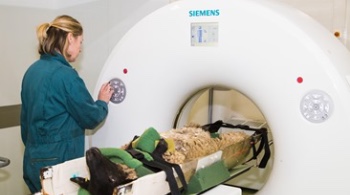Wednesday 23rd November 2016, 12:00pm
A new mobile CT scanner, currently undergoing calibration tests with Scotland's Rural College (SRUC), offers yet more clarity and inside knowledge for both livestock researchers and pedigree breeders.
The project is jointly funded by SRUC and CIEL (Centre for Innovation Excellence in Livestock), one of the four Agri Tech Innovation Centres supported by the UK Government.

From its base in Edinburgh the new facility will travel across the UK, serving pedigree livestock breeders, commercial food processors and research scientists seeking evermore sophisticated real-time analysis of not just meat yield and quality, but fish, plants and even obesity in companion animals.
Both SRUC and CIEL believe this advanced machine, in its distinctive trailer unit, offers real opportunities for innovation in these vital sectors.
The new multi-slice scanner is fast, capturing 16 images at once. This not only collects more detailed information about the subject but offers improved welfare as the live animals being studied spend less time in the scanner. It is also possible to routinely take 3D images. When this is coupled with the advanced image analysis software developed by researchers it can capture a wealth of data that can be used to measure new traits linked to the animalís composition, conformation and shape or product quality.
SRUCís Animal and Veterinary Sciences group has operated a CT scanner for the last two decades. In 2009 they began using a hired scanner, mounted in a trailer, to help provide an enhanced commercial scanning service supporting the sheep industry across the UK. The data are fed into the Basco database shared by breed societies and used for genetic evaluations.
"More recently the research has broadened out. It includes other species like cattle, pigs, poultry, fish and plant material as well as their products, like meat.
The information provided is valuable in its own right but the primary benefit to SRUC is its ability to support our work on genomics and breeding research by providing physical measurements (or "phenotypes") of traits that are hard to measure or predict by other means. This will lead to a better understanding of how genetic drives improvement in food products and help guide developments in sustainable agriculture worldwide."
The scanner will begin its work with pedigree sheep breeders in the spring of next year.
Source: Scotland's Rural College (SRUC)